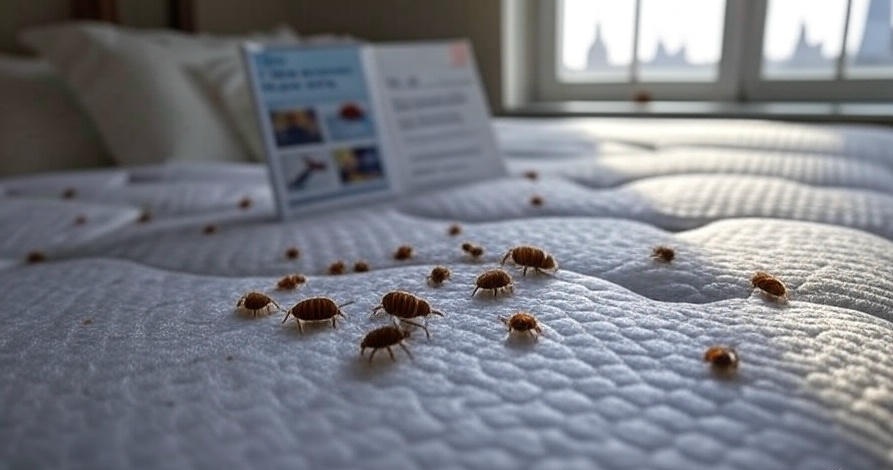
Bed bugs are a growing menace in London, turning peaceful homes into stressful battlegrounds. A critical question for residents is: how fast do bed bugs multiply? In a city with dense housing and constant travel, understanding the rapid reproduction of bed bugs is vital to preventing infestations from spiralling out of control. This comprehensive guide explores the speed of bed bug multiplication, factors influencing their spread in London, and practical steps to stop infestations early, tailored for local homeowners.
How Fast Do Bed Bugs Multiply?
Bed bugs (Cimex lectularius) are notorious for their rapid reproduction, which makes early detection and treatment essential. A single female bed bug can lay 1–5 eggs per day, totalling up to 200–500 eggs in her lifetime, which spans several months. These eggs hatch in 6–10 days under optimal conditions, producing nymphs that mature into adults within 5–6 weeks. Once mature, these new adults begin laying eggs, creating an exponential growth cycle.
In practical terms, a small infestation of just a few bed bugs can explode into hundreds within 2–3 months if left unchecked. In London’s warm indoor environments, where temperatures average 18–22°C, bed bugs thrive, accelerating their reproductive cycle and making infestations particularly challenging in flats and terraced homes.
Life Cycle of Bed Bugs
Understanding the bed bug life cycle helps explain how fast bed bugs multiply:
- Egg Stage: Tiny, white eggs (about 1mm) are laid in hidden crevices, hatching in 6–10 days.
- Nymph Stage: Nymphs go through five moults, requiring a blood meal each time, and reach adulthood in 5–6 weeks.
- Adult Stage: Adults live 6–12 months, with females laying eggs daily after feeding.
Each blood meal fuels egg production, so frequent access to hosts in busy London households can significantly boost multiplication rates.
Factors Influencing Multiplication in London
Several factors affect how fast bed bugs multiply in London’s urban setting:
- Temperature: Bed bugs reproduce fastest between 21–32°C. London’s heated homes provide near-ideal conditions year-round.
- Access to Hosts: Proximity to humans, common in crowded boroughs like Hackney or Lambeth, ensures regular blood meals, accelerating egg-laying.
- Hiding Spots: Cluttered homes or furniture with seams and cracks offer ample egg-laying sites, boosting population growth.
- Travel: London’s status as a travel hub introduces bed bugs via luggage or clothing, seeding new infestations that multiply rapidly.
Why Early Intervention Is Critical in London
Given their rapid multiplication, bed bugs can overwhelm a home in weeks if not addressed promptly. In London, where multi-occupancy buildings and shared spaces are common, infestations can spread between flats or houses, making early action even more crucial. A small cluster of bed bugs in a bedroom in Camden can quickly become a building-wide problem if left untreated.
Delaying treatment also increases costs and complexity, as larger infestations require more extensive measures, such as whole-home heat treatments or multiple chemical applications.
How to Stop Bed Bug Infestations Early
Preventing and controlling bed bug infestations relies on early detection and swift action. Here’s how London residents can tackle bed bugs before they multiply out of control:
Detect Infestations Early
- Inspect Regularly: Check mattresses, bed frames, and furniture for signs of bed bugs, such as dark faecal spots, shed skins, or live insects. Focus on seams, crevices, and hidden areas.
- Monitor Bites: Look for red, itchy welts, often in clusters or lines, which may indicate bed bug activity. For advice on managing bites, consult the NHS guide on insect bites and stings.
- Use Traps: Place bed bug interceptors under bed legs to capture crawling pests and monitor for early signs of infestation.
Clean and Treat Affected Areas
- Vacuum Thoroughly: Vacuum mattresses, carpets, and furniture, focusing on seams and crevices, and dispose of the vacuum bag in an outdoor bin.
- Wash and Dry Items: Wash bedding, clothes, and curtains at 60°C and dry on high heat for at least 30 minutes. Freeze non-washable items at -18°C for 4 days.
- Steam Cleaning: Use a steam cleaner (minimum 60°C) on mattresses and furniture to kill bed bugs and eggs, ensuring thorough coverage.
Prevent Spread During Travel
- Inspect Accommodations: Check hotel rooms for bed bugs, examining mattresses and headboards before unpacking.
- Store Clothes Safely: Keep clothes in sealed plastic bags during travel, and avoid placing luggage on beds or upholstered surfaces.
- Unpack Outside: Unpack luggage in a garage or outdoor area, washing all clothes at 60°C upon returning to London.
Home Protection Measures
- Use Mattress Encasements: Bed bug-proof covers trap pests, preventing them from feeding or laying eggs.
- Reduce Clutter: Minimise piles of clothes or papers, which provide hiding and egg-laying spots.
- Seal Cracks: Close gaps in walls, skirting boards, or furniture to limit bed bug movement and hiding areas.
- Professional Help: For suspected infestations, contact pest.co.uk’s bed bug treatment in London for expert inspections and eradication.
Health Risks of Bed Bugs
Bed bugs cause red, itchy bites, often in clusters, which can lead to allergic reactions or secondary infections if scratched. The stress of a rapidly multiplying infestation can also disrupt sleep and affect mental well-being, particularly in London’s high-pressure urban environment. Early intervention minimises these risks and restores peace of mind.
When to Seek Professional Help
If you detect signs of bed bugs—bites, blood spots, or live insects—don’t wait for the infestation to grow. In London’s multi-occupancy buildings, such as those in Islington or Southwark, bed bugs can spread quickly between flats or houses. pest.co.uk offers advanced treatments, including heat and chemical solutions, to eradicate bed bugs efficiently and prevent recurrence.
Conclusion: Act Fast to Control Bed Bugs
Answering how fast do bed bugs multiply, we’ve seen that their rapid reproduction—potentially hundreds of eggs in weeks—makes early action critical in London’s urban homes. By detecting infestations early, cleaning thoroughly, and taking preventive measures, you can stop bed bugs before they take over. For expert support, trust ThermoPest Bed Bug Treatment London to deliver tailored solutions, keeping your home pest-free and comfortable.
